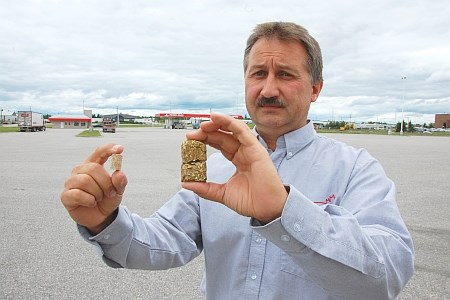Dryden’s Bryan Tardiff wants to unlock the vast potential of local energy independence in northwestern Ontario.
The local fuel distributor is spearheading a plan that will introduce some cutting-edge European technology for a district heating system for two industrial parks now under construction.
Tardiff has teamed up with trucker Louie Ricci, an Ignace log hauler, to form Far North Biomass. They have partnered with German engineering firm Lambion, a global expert in converting biomass to energy.
“We want to start developing a domestic market for more wood pellets and briquettes,” said Tardiff.
Lambion makes high-efficiency boiler combustion systems using low-grade biomass and various wood residuals for energy generation.
“They specialize in burning stuff that people say won’t burn,” said Tardiff.
Through their negotiations, they have a commitment with Lambion and the City of Dryden to study the feasibility of a district energy system using a German-designed boiler.
The entire project is a joint venture with the Dryden Development Corporation to supply heat to future businesses in the Norwill Industrial Park and the Centennial Business Park, as well as businesses along the Highway 17 corridor.
Tardiff is pitching the whole venture as an opportunity for Dryden and Northern communities to take their economy into their own hands, keep dollars local, and create local jobs.
“Dryden, like every community, is trying to attract industry, and what better way than to provide them with heat before they even build their plant?”
The joint Far North-Lambion partnership would supply heat energy to the local utility for distribution to consumers. Lambion would be a 50-per-cent owner in the district heating system.
The technology allows them to pipe heat as far as 12 kilometres. Currently they are surveying retailers along the Highway 17 commercial strip.
Tardiff believes businesses could save between 20 to 30 per cent on their current energy costs.
His company has also signed on with an Austrian appliance manufacturer, Gilles Biomass Heating, to bring European wood pellet-fired boilers to North American consumers. Tardiff’s company is signing a deal to be their exclusive distributor.
Lambion officials, who were scouting the Dryden area in early June, are considering setting up their North American headquarters in town. They would contract local machine shops and fabricators to build their equipment.
Tardiff said the district energy system would also serve as a working pilot unit for Lambion and a training centre for operators of future plants.
Tardiff and Ricci would also come in on the biomass fuel side by constructing a wood pellet and hog briquette plant to ensure there is a stable fuel supply for future district energy systems.
They would source fibre from local harvesters and from residuals produced by Aspenware, a British Columbia maker of biodegradable cutlery, which is slated to move into the Norwill Industrial Park.
Tardiff said they are in talks with Aspenware to supply them on the front end with veneer-quality aspen, birch and poplar to make the utensils, while using their residual waste on the back end for the district heating system.
If all goes well with their feasibility study, they could be producing energy by September 2011.
Tardiff and Ricci originally started the company to participate in the province’s fibre competition. They had the idea of establishing a local wood pellet plant to supply Ontario Power Generation as well as a lucrative European market.
The partners began their research by flying to Europe to attend sustainable energy and wood pellet conferences in Germany and were completely blown away by the technology they saw.
They made company contacts in Austria and Italy, and their plan began to diversify.
When they couldn’t figure out the economics and the logistical bottlenecks of moving pellets overseas, they convinced Lambion to come to Canada.
Lambion-designed boilers produce little in the way of emissions and the feedstock can include almost any type of wood waste, including bark and tree limbs.
“We’ve worked every angle we can,” said Tardiff, who’s been to Europe four times in the last year.
With pellets selling for $300 a tonne in North America for residential use, they decided to focus on developing a domestic market.
“We decided that Europe was something we’d look at later and the Ontario Power Generation process wasn’t what it was cracked up to be. But there was so much potential with these types of appliances that we needed to develop a domestic market somehow.”
Tardiff and his partners believe there is even more potential to service First Nation communities and the exploration companies in the James Bay Ring of Fire.
He envisions a series of small biomass-fueled generating stations across the Far North.
It would allow remote communities to be more energy independent rather than relying on expensive aviation hauls of diesel fuel for generators.
“There is so much potential if we can get everyone on board.”




